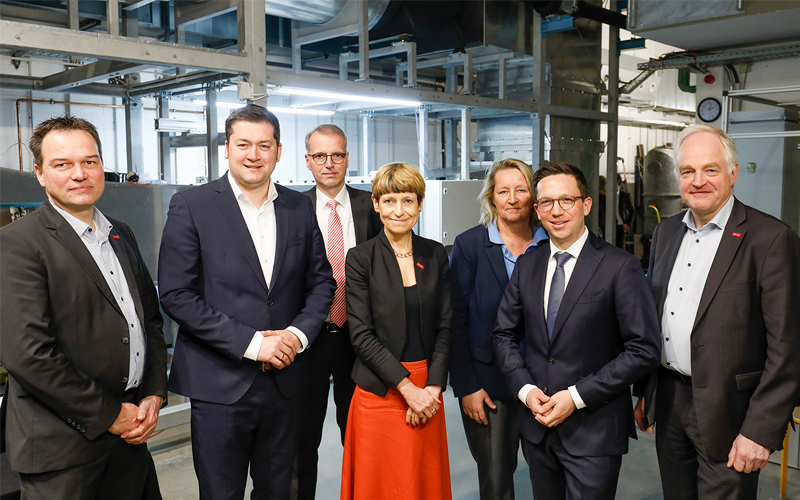 On 13 April, Falko Mohrs, Lower Saxony’s Minister for Science and Culture, visited the mobility cluster Research Airport in Braunschweig. For this purpose, he was a guest at Technische Universität Braunschweig and the German Aerospace Center (DLR). The focus of the talks was aerospace with current strategies and projects.
On 13 April, Falko Mohrs, Lower Saxony’s Minister for Science and Culture, visited the mobility cluster Research Airport in Braunschweig. For this purpose, he was a guest at Technische Universität Braunschweig and the German Aerospace Center (DLR). The focus of the talks was aerospace with current strategies and projects.
Among others, Professor Angela Ittel, President of TU Braunschweig, Professor Anke Kaysser-Pyzalla, Chairwoman of the DLR Executive Board, and Dr. Thorsten Kornblum, Lord Mayor of the City of Braunschweig, were present. The meeting focused on current research topics and projects as well as technology transfer.
“No other means of transport consumes more energy than flying. To enable climate-neutral and sustainable air transport by 2050, an energy turnaround in aviation is necessary. Important findings and impulses for the development of environmentally friendly aircraft, efficient propulsion technologies and innovative assistance systems come from the Braunschweig Research Airport,” says Science Minister Falko Mohrs. “With the Research Airport and the research institutions and companies cooperating here, the region has developed into a top location for mobility research – with TU Braunschweig as an important pillar.”
“The Research Airport in Braunschweig is a unique research hub in Germany. Here, TU Braunschweig comes together with research institutions, federal authorities and a network of over 40 companies around topics such as autonomous driving, battery research and sustainable flying. Here we have the infrastructure for excellent research, but also for putting our research results directly into practice and testing them. The Research Airport contributes directly to major transformation processes and the future viability of our society,” says Angela Ittel.
Lord Mayor Dr. Thorsten Kornblum adds: “We as a city welcome and support the enormous development at the Research Airport. This is a clear signal that we are optimally positioned as a science and business location for Braunschweig, especially with the focus on mobility and the future topic of energy transition.”
At the Institutes of Jet Propulsion and Turbomachinery (IFAS) and Fluid Mechanics (ISM), Minister Mohrs was able to get an idea of aerospace research at TU Braunschweig. Professor Jens Friedrichs (IFAS) opened the doors to various laboratories and test stands.
Professor Astrid Lampert presented the Aeronautics Research Centre Niedersachsen (NFL), which unites the aeronautical and space technology institutes of TU Braunschweig, DLR and Leibniz University Hannover under one roof. What drives the scientists is the sustainability of flying in the future. The challenges here are energy supply, economic efficiency and safety. To this end, they jointly develop key technologies and communicate facts about the discourse in aerospace.
One attraction was the so-called Propulsor test stand, which is unique in Europe. This is used for research into future aircraft propulsion components. Professor Jens Friedrichs and his team are investigating how engines and propellers will have to be designed in the future in order to reduce consumption and emissions in aerospace.
“Sustainable and Energy Efficient Aviation” (SE²A) also received special attention. The Cluster of Excellence at TU Braunschweig deals with the challenge of making future air transport efficient while at the same time meeting the competing demands of continuous growth and ecological sustainability. In addition to TU Braunschweig, the German Aerospace Center, the Leibniz University Hannover (LUH), the Braunschweig University of Art and the Physikalisch-Technische Bundesanstalt are involved in SE²A.
The Cluster of Excellence is part of the research focus “Mobility” at TU Braunschweig, where innovative solutions for urgent questions in mobility and transport are developed. In addition to the NFL, the Automotive Research Centre Niedersachsen (NFF), which is also located at the Research Airport, is also involved here and is dedicated to ground-based transport from rail to individual mobility, e.g. by car or bicycle. Together, the two centres form the basis for one of the most comprehensive focal points for mobility research at a German university.
“Our goal is to use synergy effects to make everything that drives on the road and flies through the air better and more sustainable,” explains Professor Friedrichs, who is the spokesperson for the mobility research focus.
With around 3,700 employees, the mobility cluster Research Airport in Braunschweig is a location with a high research density and actively practised technology transfer. Research and development is carried out here on current global topics, such as the energy transition (including hydrogen), the mobility transition with a focus on “autonomous driving”, but also the drive transition (emission-free mobility).
Source: Press release TU Braunschweig, 13.04.2023